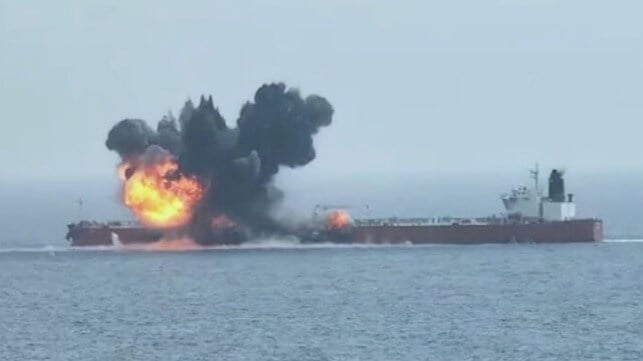Allianz: Geopolitical Tensions Risk Reversing Declines in Vessel Losses

The global merchant shipping industry is grappling with a fast-changing geopolitical landscape that is creating new risks and challenges, an emerging phenomenon that has the potential to reverse significant gains achieved over the past decade in terms of safety. Global insurer Allianz released its Safety and Shipping Review 2025 showing that although shipping losses have maintained a downward trend, the situation could change due to geopolitical headwinds.
The shipping industry continues to be the engine propelling the global economy, transporting 90 percent of international trade highlights the report. Despite its importance, Allianz says the industry is operating in an increasingly volatile and complex environment characterized by attacks, vessel detentions, and sanctions, as well as the fallout from incidents involving damage to critical sub-sea cables. In recent months, increasing protectionism and tariff wars have added another layer of risks.
Despite the ever-present dangers, the industry is performing relatively well in terms of safety improvements reports Allianz. In 2024, the industry recorded only 27 large ship losses, which is a record low considering 35 ships were lost the previous year. The 2024 figure represents a 20 percent annual decline and a 75 percent decline in total losses over the past decade (105 in 2015). When compared to the 1990s, the level of safety improvements is dramatic. Two decades ago, the industry was losing over 200 vessels annually but managed to halve it a decade ago. Since then, there has been an impressive trend of decline in losses.
Allianz is now warning that the gains could be eroded. The U.S.-China trade conflict, Russia’s growing shadow fleet, and emerging challenges brought about by decarbonization have the potential to offset the gains. The U.S. has come out aggressively with tariffs against China and also intends to impose port charges on Chinese vessels. The impact according to the report has the potential to create significant stress and disruption of supply chains, pressure on trade routes, and port congestion.
Russia’s shadow fleet is another major threat to maritime safety and the environment. The shadow fleet, composed of older, poorly maintained oil tankers, has expanded rapidly since the Ukraine invasion. Today, it is estimated that around 17 percent of the world tanker fleet belongs to the shadow fleet, which is close to 600 tankers trading Russian oil alone. These vessels have been involved in tens of incidents including fires, collisions, and oil spills.
“The relevance of political risk and conflict as a potential cause of maritime loss is increasing with heightened geopolitical tensions,” said Captain Rahul Khanna, Allianz Commercial Global Head of Marine Risk Consulting. “Total losses from traditional causes may have reduced over time, but we could be in a position where this positive trend is potentially offset by war and other political-related exposures. As an industry, we are in a better position with regard to traditional risks, but there is a renewed focus on geopolitical risks.”
Though the shipping industry is facing an uncertain immediate future, 2024 was another year characterized by significant improvements. South China, Indochina, Indonesia, and the Philippines however maintained a negative reputation as the hotspot of losses. Together with the British Isles and the East Mediterranean and Black Sea, the regions reported four losses each and 169 cumulatively over the past decade.
Fishing vessels have replaced cargo ships in terms of losses, accounting for 40 percent of the total losses. Foundering continued to be the main cause of losses accounting for close to 50 percent, with fire being another major cause. Extreme weather was reported as being a factor in at least seven losses during the year with the average age of a vessel involved in a total loss over the past 10 years being 29.
The review shows that the number of reported shipping casualties or incidents around the world increased by around 10 percent in 2024, rising to 3,310 compared to 2,963 in the previous year. The British Isles saw the highest number at 799, followed by the East Mediterranean and Black Sea at 694.
For the industry, cases of fires remain a major concern with seven losses reported in 2024, the same number as a year earlier. Notably, there were 250 reported fire incidents during the year, up by 20 percent year-on-year and the highest total for a decade. Nearly a third of the fire incidents occurred on either container, cargo, or RoRo vessels. Critically, more than 100 of the total losses were caused by fires over the past decade.
Allianz reports that while shipowners are trying to operate vessels safely within an ever-changing and dynamic regulatory framework, this is becoming increasingly difficult. It highlights that shipping choke points are increasingly coming under fire as geopolitical and regional tensions rise. The Suez Canal has for instance recorded a massive decline in transits due to Houthi attacks while the South China Sea, which carries one-third of global shipping, could see disruptions in the future. The same is transpiring in the Arctic waters, which have become focal points of international tension as countries seek control over emerging trade routes as the ice melts.
